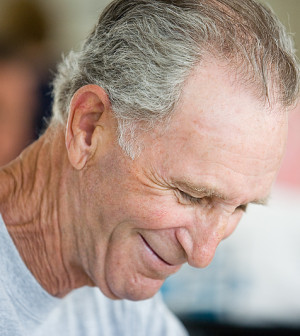- 8 Ways to Increase Dopamine Naturally
- 7 Best Breads for Maintaining Stable Blood Sugar
- Gelatin vs. Collagen: Which is Best for Skin, Nails, and Joints?
- The Long-Term Effects of Daily Turmeric Supplements on Liver Health
- Could Your Grocery Store Meat Be Causing Recurring UTIs?
- Are You Making This Expensive Thermostat Error This Winter?
- Recognizing the Signs of Hypothyroidism
- 10 Strategies to Overcome Insomnia
- Could Artificial Sweeteners Be Aging the Brain Faster?
- Techniques for Soothing Your Nervous System
Stay Safe When Temperatures Rise

Extremely hot weather can be deadly if you don’t take the proper precautions, an expert warns.
There were 123 heat-related deaths in the United States in 2014, according to the National Weather Service.
“People suffer heat-related illnesses when their bodies are unable to compensate and properly cool themselves,” Dr. Richard Schwartz, chair of emergency medicine at Georgia Regents University in Augusta, said in a university news release.
Signs that the heat is getting to be too much include: weakness; heavy sweating; nausea; giddiness; dizziness; collapse; fatigue; and cool, clammy, red or flushed skin, according to Schwartz. If you experience these symptoms, move into an air-conditioned area, rest and drink cool beverages, he recommended.
But, there are ways to prevent heat illness from occurring, he added.
“No matter if you’re in the garden, on the playing field, at the beach or at the construction site, summer activity should be balanced with measures that aid the body’s cooling mechanisms and prevent heat-related illness,” he advised.
On hot days, try to limit your outdoor activity to early morning or early evening. If you’re outside during the day, take regular breaks in shady areas or indoors.
Avoid overexertion on hot days. If doing activities in the heat makes your heart pound and leaves you gasping for breath, move to a cool or shaded area to rest. This is especially crucial if you become lightheaded, confused, weak or faint, Schwartz said.
Try to stay out of the sun. If you have to be outside, apply sunscreen and wear lightweight, loose-fitting, light-colored clothing and a wide-brimmed hat. If you work in the sun, take frequent breaks and try not to push yourself too hard.
Be sure to drink plenty of fluids. If you’re doing intense exercise in the heat, drink two to four glasses of cool fluids each hour. A sports drink can replace salts and minerals lost in sweat. Even if you’re swimming, you need to drink plenty of fluids, Schwartz said.
Don’t eat a heavy or hot meal before you go outside in hot weather, because doing so will cause your body to heat up faster. Don’t drink liquids with alcohol or large amounts of sugar, and avoid extremely cold beverages, which can cause stomach cramps.
If you’re outside during hot weather, monitor the condition of family members, friends and co-workers, and have someone keep an eye on you, too. If you’re 65 or older, ask a relative or friend to check on you twice a day during a heat wave. If you know a senior, check on them often during hot weather.
If your home doesn’t have air conditioning, find a public place that does. Taking a cool shower or bath is another way to keep cool if you don’t have air conditioning, Schwartz said. Try to avoid using your stove or oven because they can significantly raise the temperature in your home.
More information
The U.S. Centers for Disease Control and Prevention has more about extreme heat.
Source: HealthDay
Copyright © 2026 HealthDay. All rights reserved.










